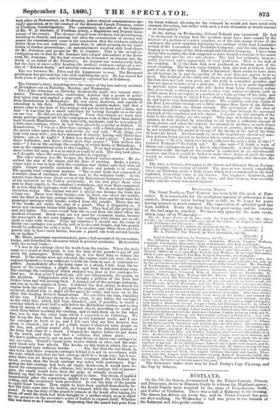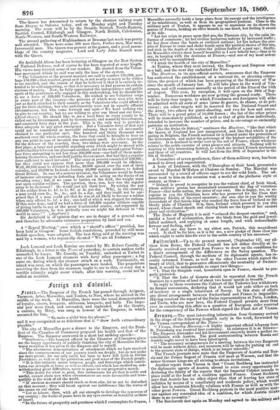SCOTLAND.
On the 7th the Queen, accompanied by the Prince Consort, Princes, and Princesses, drove to Braemar Castle to witness the Highland games ; the Royal Family were received by the clans of Farquharson, Duffe, and Forbes of Strathdon. There was a ball at Balmoral in the evening. The Queen has driven out every day, and the Prince Consort has gone out deer-stalking. On Wednesday a ball was given to the tenants of the Balmoral and Abergeldie estates. The Queen has determined to return by the shorteat railway route from Aboyne to Osborne today, and on Monday night and Tuesday morning. The route will be by the Deeside Scottish North-Eastern, Scottish Central, Edinburgh and Glasgow, North British, Caledonian, North-Western, and South-Western Railways.
The annual gathering of Highlandmen at Braemar last week was pretty well attended. There were some 300 men there, Forbes men, Mar men, Invercauld men. The Queen was present at the games, and a good assem- blage of the country magnates. Lord and Lady John Russell were with the Queen.
Sir Archibald Alison has been lecturing at Glasgow on the Best System of National Defence, and of course he has been reported at some length. His views may interest some of our readers. He started from the Volun- teer movement which he said was only the base of the system.
" The Volunteers at the present moment are said to number 130,000, per- haps 150,000-that number, great as it is, is not nearly so many as he wishes to see enrolled, and the reason of that he believed is that it is entirely in- tended to be self-supporting, so that it is necessary to find persons in certain stations of society. Now, he fully appreciated the independence and public spirit of the gentlemen who engaged in this undertaking, but he should like to see a force of 300,000 Volunteers. He wished to see Volunteer corps in every part of the country-the privates of which were men who were just as much attached to their country as the Volunteers who could afford to pay for their clothing, but who unfortunately were not in equally affluent circumstances, but who came forward and said-' We have nothing else to give to our country, but we are willing to give our blood and our lives.' (Loud cheers.) He should; like to see a local force in every county to be called out by Government, paid by Government, and armed by Government, and exercised forty days in the year. This is the only way to provide a force adequate to any great emergency. But a Volunteer force of that sort could not be considered as moveable columns, they were all necessarily chained to one particular spot. One hundred' and thirty thousand men scattered over the whole country, the force that could be brought to bear on - any one point in case of invasion was extremely small. In order to provide for the defence of the country, then, two things were necessary. In the first place, a large and powerful standing army which might be moved with perfectfacility between one place and another, and in the second a great Volun- teer force amounting to not less than 300,000 men-one-half of them main- taining themselves, and one-half paid by Government. But had they a regular force sufficient to meet invasion ? The army at present consisted of 230,000; but they could not suppose that more than 200,000 would be efficient. Wellt 80,000 must be devoted to India, 40,000 spread over the rest of their colonies, and 30,000 in Ireland-leaving 50,000 regular soldiers to defend Great Britain. In case of a serious invasion, the Volunteers would be found a immense advantage in defending forts and in acting on the flanks of an invading army; but, if we came to battles on the field, the weight must rest upon regular soldiers. The question, then, was, how was the regular army to be increased ? He would just tell them how. By raising the pay of the soldier from 18. lel. to Li. 8d. or 2s. per day. Why, in the country, a man could earn 2s., 3s., 4s., and 5s. a day, and they could not be sur- prised that if a man could get that he was at all likely to become a soldier when only offered is. ld. a day, one-half of which was stopped for rations. If this were done, and if we had a force of 100,000 regular soldiers capable of giving battle to any of the great Continental armies, and supported by :300,000 Volunteers, he was perfectly sure we might bid defiance to the world in arms.'" (Applause.)
Sir Archibald is of opinion that we are in danger of a general war, and therefore he advocates extensive preparation by land and sea.
A "Repeal Meeting," over which a "sheriff's officer" presided, has been held in Glasgow. Some foolish resolutions, preceded by still more foolish speeches, were adopted. The best thing said at the meeting was said by a woman, who repeatedly shouted "We are all Irishmen."
Loch Lomond and Loch Katrine are stated by Mr. Robert Cassidy, of Edinburgh, in a letter to the Times of yesterday, to contain sunken rocks unmarked by buoys. Mr. Cassidy, on Tuesday, embarked at Tarbet in one of the Loch Lomond steamers with forty other passengers ; a fog came on, during which the steamer struck on a rock. Fortunately, an island was near, on which the passengers were landed. The proprietors receiving the dues from the steamers ought to see to this, or some day a terrible calamity might occur which, after this warning, could not be called an accident.



























 Previous page
Previous page